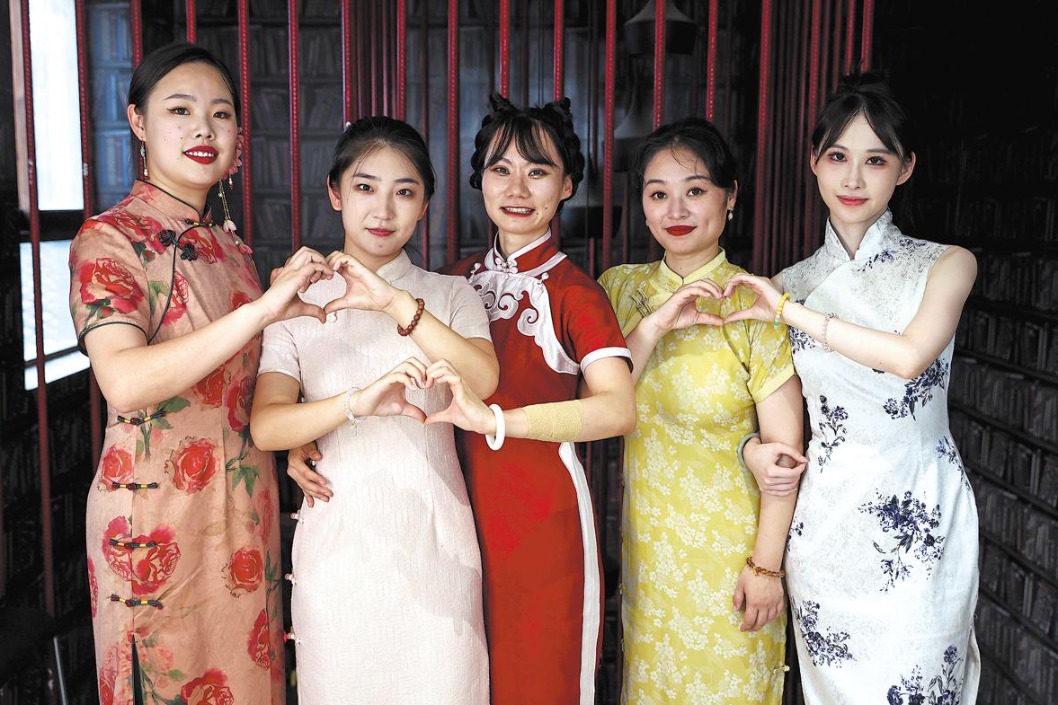What they say

Editor's note: The State Council Information Office held a group interview on Friday in Beijing, during which representatives of veterans and those who work on veteran affairs shared their stories and contributions in the new era.
 After retiring from the military, I worked as a welding technician, where I tackled more than 30 major technical challenges and trained over 50 skilled welders. I also helped address major technical issues in the Zhuque-2 carrier rocket engine, making contributions to the electric power and national defense sectors. Veterans should continue to carry forward the military's fine traditions. Employers should ensure a good match between veterans and job roles to fully leverage their potential. At my company, veterans quickly became key contributors, drawing on the experience and technical skills they gained during their service.
After retiring from the military, I worked as a welding technician, where I tackled more than 30 major technical challenges and trained over 50 skilled welders. I also helped address major technical issues in the Zhuque-2 carrier rocket engine, making contributions to the electric power and national defense sectors. Veterans should continue to carry forward the military's fine traditions. Employers should ensure a good match between veterans and job roles to fully leverage their potential. At my company, veterans quickly became key contributors, drawing on the experience and technical skills they gained during their service.
Cheng Ping, welding team leader at the boiler team of the maintenance department of Dezhou power plant of Huaneng Power International
 After serving 30 years in the military, I decided to volunteer as a border guard. Four generations of my family have left footprints on the Pamir Plateau, patrolling the frontier. Starting with my grandfather, who guided the People's Liberation Army, and to my children who are now dedicated to border security, our family's legacy continues. To date, our family has raised over 20 military personnel and more than 80 border patrol volunteers.
After serving 30 years in the military, I decided to volunteer as a border guard. Four generations of my family have left footprints on the Pamir Plateau, patrolling the frontier. Starting with my grandfather, who guided the People's Liberation Army, and to my children who are now dedicated to border security, our family's legacy continues. To date, our family has raised over 20 military personnel and more than 80 border patrol volunteers.
Longjike Kadeer, a voluntary border guard in Tashikurgan Tajik autonomous county of the Xinjiang Uygur autonomous region
 I've been a docent for 16 years, and saying the same words on every tour has never diminished my passion. Each tour feels like a conversation through time with revolutionary martyrs, and I can truly feel their spirit living on. When veterans become docents, they bring military discipline and firsthand experience into the storytelling of Red culture, making it even more powerful and moving.
I've been a docent for 16 years, and saying the same words on every tour has never diminished my passion. Each tour feels like a conversation through time with revolutionary martyrs, and I can truly feel their spirit living on. When veterans become docents, they bring military discipline and firsthand experience into the storytelling of Red culture, making it even more powerful and moving.
Cheng Xing, a docent at the Huangma Uprising and Hubei-Henan-Anhui Soviet Area Memorial Park
 After leaving the military, I decided to go into business for myself and returned to my hometown. As the village head, I've worked with the community to transform our village. We've attracted nine enterprises, starting eight rural tourism ventures and opened over 10 homestays, creating jobs and opportunities for more than 360 villagers. Using my military background in information support, I've also addressed key rural governance challenges. It's essential to leverage the preferential policies available to veterans to encourage them to contribute to rural vitalization and other vital areas.
After leaving the military, I decided to go into business for myself and returned to my hometown. As the village head, I've worked with the community to transform our village. We've attracted nine enterprises, starting eight rural tourism ventures and opened over 10 homestays, creating jobs and opportunities for more than 360 villagers. Using my military background in information support, I've also addressed key rural governance challenges. It's essential to leverage the preferential policies available to veterans to encourage them to contribute to rural vitalization and other vital areas.
Huang Hengli, Party secretary and village committee director of Huangheying, Maoying township, Ziyun Miao and Bouyei autonomous county, Guizhou province
 I offer services like policy advice, rights protection, home visits and support for retired veterans. My goal has always been to ensure that veterans are respected and honored by everyone. We work closely with relevant departments to provide vocational training, helping veterans transition smoothly from military to civilian life. Over the past six years, my colleagues and I have visited all 59 villages and communities in our area, making over 1,000 visits to veterans. We've built genuine connections with them.
I offer services like policy advice, rights protection, home visits and support for retired veterans. My goal has always been to ensure that veterans are respected and honored by everyone. We work closely with relevant departments to provide vocational training, helping veterans transition smoothly from military to civilian life. Over the past six years, my colleagues and I have visited all 59 villages and communities in our area, making over 1,000 visits to veterans. We've built genuine connections with them.
Li Shangxuan, a worker at the veteran service station of Xianshuigu township, Jinnan district, Tianjin
Today's Top News
- China to open its door to foreign investment wider
- China criticizes Canadian tariffs on products containing Chinese steel
- US legislative chaos undermines its democracy
- Why China is irreplaceable in supply chain
- China's FDI inflow tops $700b since 2021
- Australia, China set to bolster steel partnership






























